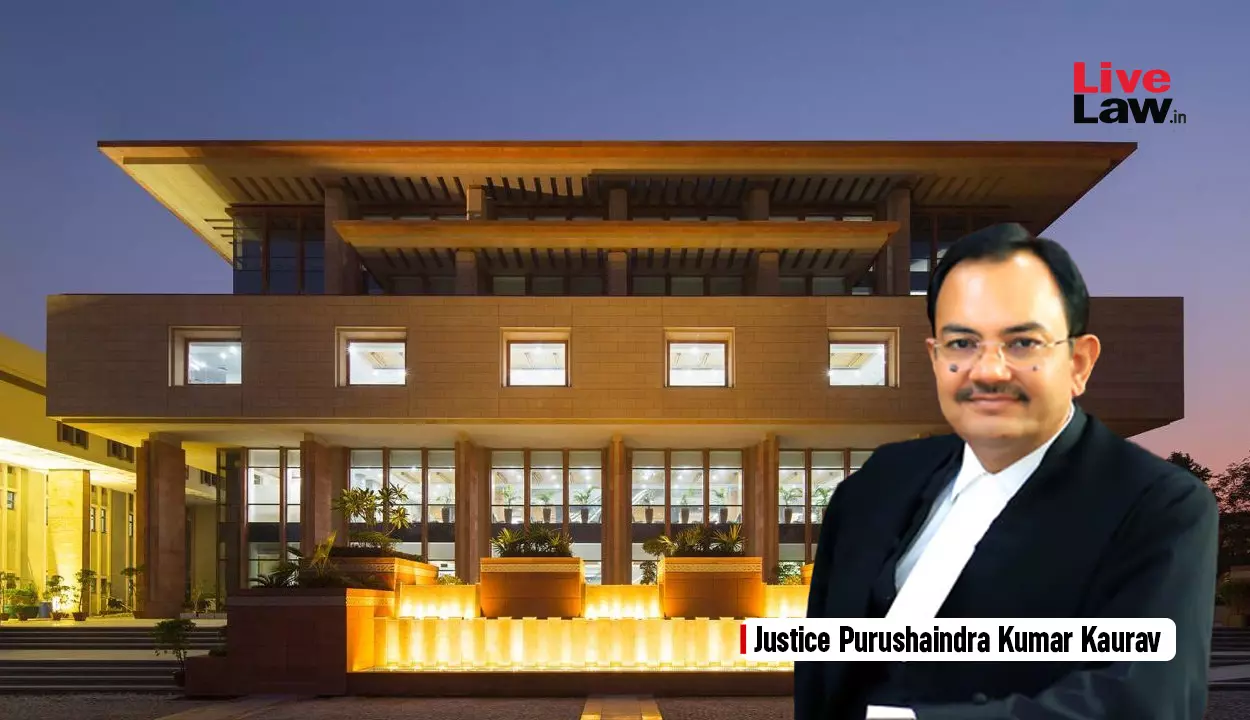- Home
- /
- High Courts
- /
- Delhi High Court
- /
- Civil Courts Not Prohibited From...
Civil Courts Not Prohibited From Granting Anti-Arbitration Injunction In Foreign-Seated Arbitration If Proceedings Are Vexatious: Delhi HC
Mohd Malik Chauhan
30 July 2025 6:40 PM IST
The Delhi High Court bench of Justice Purushaindra Kumar Kaurav has held that Civil Courts are not prohibited from granting anti arbitration injunction in a foreign seated arbitration if the proceedings are conducted in a vexatious and oppressive manner. The present application has been filed seeking an injunction against the ongoing arbitration before the International Chamber...
The Delhi High Court bench of Justice Purushaindra Kumar Kaurav has held that Civil Courts are not prohibited from granting anti arbitration injunction in a foreign seated arbitration if the proceedings are conducted in a vexatious and oppressive manner.
The present application has been filed seeking an injunction against the ongoing arbitration before the International Chamber of Commerce (ICC) stating that the proceedings are vexatious, oppressive, unconscionable and against the public policy of India.
The Plaintiff submitted that the arbitral proceedings have been rendered oppressive, vexatious, and contrary to the settled principles of natural justice, owing to the material non-disclosure by Mr. Yeap, co-arbitrator appointed by the defendant, regarding his prior association in arbitral proceedings involving Mr. Manbhupinder Singh Atwal, who is the Managing Director and Promoter of the defendant.
Per contra, the Defendant submitted that the present suit is not maintainable either in law or on facts, inasmuch as it directly seeks to restrain arbitration proceedings which have been commenced pursuant to a valid and binding arbitration agreement between the parties.The High Court of Singapore has already passed the judgment qua the impartiality of the arbitrator and therefore, at this juncture, the plaintiff cannot reagitate the same issue.
The court while copiously referring to the Supreme Court judgments held that the court is competent to try all civil suits under section 9 of the CPC as the jurisdiction of a Civil Court can only be ousted if it is expressly or impliedly is barred by any law for the time being enforced. Courts do not easily infer exclusion of the jurisdiction and see factors like adequacy of remedies before the Tribunal, adherence to judicial procedures and legislative intent. In the absence of a clear bar on jurisdiction, the court retains its plenary jurisdiction.
The Delhi High Court in Dabhol Power Company held that the court can grant anti arbitration injunctions despite contentions that the Arbitral Tribunal can decide on its own jurisdiction. Neither section 5 nor section 45 of the Arbitration and Conciliation Act, 1996 (Arbitration Act) prohibit civil courts from doing the same especially when the proceedings in a foreign seated arbitration are found to be oppressive.
The court further observed that the core issue in this case is not whether the co-arbitrator was actually bias instead, it is about non-disclosure at the time of appointment and denial of an opportunity to object. This non-disclosure despite knowledge and awareness undermines the impartiality of the arbitrator and taints the entire arbitration process. Impartiality is important and it is even more critical in arbitration where party autonomy is key. The Arbitration Act embodies the principle of minimal judicial interference but the courts must intervene when proceedings become oppressive and deny rights one of the parties. In such a case, an arbitration clause cannot override the plenary jurisdiction of the civil courts.
It held that “for, the Courts in this country are not passive observers; they are duty-bound to intervene when a party is subjected to sustained harassment and procedural manipulation under the guise of lawful process. To allow the defendant to continue with such vexatious proceedings would be to permit the very erosion of judicial integrity and to allow civil process to become an instrument of oppression.”
The court observed that the conduct of the defendant reflects an abuse of process of which the sole aim is to burden the plaintiff with unjust arbitration proceedings. Despite being aware of the challenges pending before the competent forums, the defendant continued to press for arbitration thereby ignoring the principles of fairness and judicial comity. The admission of the co-arbitrator himself that disclosure would have raised objections as to his impartiality confirms the importance of non-disclosure in the present case.
It further observed that the arbitration in the facts of the present case is prima facie vexatious and oppressive.If the arbitration proceedings were to continue without first addressing the plaintiff‟s legitimate apprehensions regarding the neutrality of the arbitrator, the resultant Award would be susceptible to challenge, thereby rendering the entire exercise futile and causing multiplicative delays and costs.
It concluded that an interim injunction is necessary to prevent irreparable harm and ensure that the arbitration is conducted in a fair and reasonable manner.
Accordingly, the present application was allowed.
Case Title: ENGINEERING PROJECTS (INDIA) LIMITED Versus MSA GLOBAL LLC (OMAN)
Citation: 2025 LiveLaw (Del) 901
Case Number: CS(OS) 243/2025, I.A. 9723/2025 and I.A. 13166/2025
Judgment Date: 25/07/2025
For Plaintiff: Mr. Sandeep Sethi, Sr. Adv. with Mr. Ajit Warrier, Mr. Angad Kochhar, Mr. Himanshu Setia, Mr. Vedant Kashyap, Mr. Sumer Dev Seth, Ms. Richa Khare and Ms. Riya Kumar, Advs.
For Defendant: Mr. Rajiv Nayar, Sr. Adv. with Mr. Kirat Singh Nagra, Mr. Kartik Yadav, Mr. Pranav Vyas, Ms. Sumedha Chadha, Mr. Sankalp Singh, Mr. Esh Gupta and Mr. Pritesh Raj, Advs.



